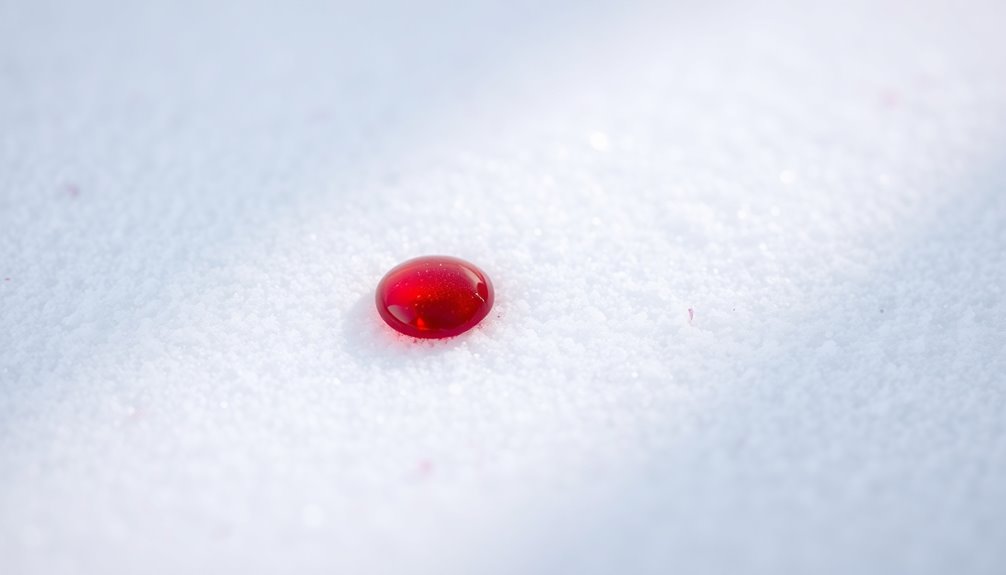Implantation bleeding can come as a surprise, and it's a sign of early pregnancy! It occurs when a fertilized egg attaches to the uterine lining, typically 10 to 14 days after conception. You may notice light spotting that's pink or brown—way lighter than your usual period. It lasts just a few hours to a few days, and might come with mild cramping. Curious to learn more about what's considered normal and when to seek help?
Key Takeaways
- Implantation bleeding occurs when a fertilized egg attaches to the uterine lining, typically 10 to 14 days post-conception.
- It is characterized by light spotting, often pink or brown, lasting a few hours to a few days.
- About 25% of pregnant individuals experience implantation bleeding, but many may not notice it.
- Unlike a menstrual period, implantation bleeding is usually lighter, shorter, and lacks significant clotting.
- Seek medical advice if experiencing heavy bleeding, severe pain, or significant changes in bleeding patterns.
What Is Implantation Bleeding?

Implantation bleeding is a light spotting that happens when a fertilized egg attaches to the uterine lining, usually around 10 to 14 days after conception.
This early pregnancy sign can be characterized by a pink or brown color, which is lighter than the bright red you'd see during your menstrual period. About 25% of pregnant individuals experience this type of bleeding, but many mightn't notice it at all.
Typically, implantation bleeding lasts from a few hours to a few days, making it shorter than a regular period. It's considered a normal part of the early stages of pregnancy and usually doesn't require medical treatment unless you experience heavy bleeding or severe cramps. Awareness of early detection of potential pregnancy symptoms, such as implantation bleeding, can help individuals seek timely medical advice.
When Does Implantation Bleeding Happen?

Wondering when you might notice implantation bleeding? It typically occurs between 10 to 14 days after conception, aligning with your expected menstrual period. This light spotting happens when a fertilized egg attaches to the uterine lining. Here's a quick look at the timing:
| Day After Conception | Possible Sign | Note |
|---|---|---|
| 10 | Light spotting | Early sign of pregnancy |
| 11 | Possible implantation bleeding | Uterine lining interaction |
| 12 | Slight cramping | May feel different than period |
| 14 | Missed period | Time to take a test |
Recognizing the timing of implantation bleeding can help you detect early pregnancy and understand the difference from a regular menstrual flow. Additionally, understanding mammography guidelines can be important for women considering their reproductive health and future screenings.
How to Differentiate Implantation Bleeding From a Period

Distinguishing implantation bleeding from your regular period can be essential for understanding your body and confirming pregnancy.
Implantation bleeding typically involves light bleeding or spotting, while a menstrual period means heavy bleeding that often requires a pad or tampon. The color of implantation bleeding is usually pink or brown, contrasting with the bright red of a typical period.
Time-wise, implantation bleeding lasts only a few hours to a couple of days, whereas a menstrual period usually lasts about a week. Additionally, clotting is uncommon with implantation bleeding, while menstrual periods may show small clots.
You might experience mild cramping with implantation bleeding, but menstrual cramps are generally more intense and prolonged, serving as a normal sign of your cycle. Understanding emotional dysregulation can also help in recognizing how bodily changes might affect your emotional state during this time.
Signs and Symptoms of Implantation Bleeding

Recognizing the signs and symptoms of implantation bleeding can help you identify early pregnancy. You might notice light spotting, often light pink or brown, which distinguishes it from the brighter red of menstrual bleeding.
Implantation bleeding usually lasts a few hours to a few days, while a typical period lasts about a week. Mild cramping may accompany this spotting, but it's generally less intense than what you experience during menstruation.
About 25% of pregnant individuals report these signs, though some may not experience implantation bleeding at all. Keep in mind that other early signs of pregnancy, like nausea, fatigue, and tender breasts, may also appear alongside implantation bleeding, marking this as a normal part of pregnancy.
Duration and Intensity of Implantation Bleeding

After identifying the signs and symptoms of implantation bleeding, it's important to understand how long it lasts and its intensity. Typically, implantation bleeding lasts a few hours to a maximum of three days. It's characterized by very light bleeding, often just spotting rather than a heavy flow.
| Duration | Intensity | Requires Pads |
|---|---|---|
| Few hours | Very light | No, usually panty liner |
| Up to three days | Spotting | Rarely requires pads |
| Short duration | Light bleeding | No tampon needed |
| Normal part of pregnancy |
Most women find that they don't need pads or tampons during this time. If you experience heavy bleeding or clots, consult a healthcare provider for further evaluation. Additionally, it's essential to recognize that emotional instability can sometimes accompany physical health changes during pregnancy.
When to Seek Medical Advice

If you notice heavy bleeding or blood clots, it's vital to contact your healthcare provider, as these symptoms might indicate a complication beyond normal implantation bleeding.
You should also seek medical advice if you experience any of the following:
- Severe cramping or pain
- Fever or chills
- Significant changes in your bleeding patterns
Differentiating between implantation bleeding and menstrual bleeding can be tricky.
If you're uncertain, a consultation can provide clarity during early pregnancy. Monitoring your vaginal bleeding is important, and any unusual changes warrant a visit to your healthcare provider.
Early assessment can offer reassurance and guarantee the health of both you and your developing embryo, so don't hesitate to reach out if something feels off. Additionally, understanding the potential emotional toll of online cheating may help you navigate any stress related to early pregnancy complications.
Can You Take a Pregnancy Test After Implantation Bleeding?

Wondering when the right time is to take a pregnancy test after experiencing implantation bleeding?
It's best to wait a few days after the bleeding stops for the most accurate results. Implantation bleeding usually happens 10 to 14 days after conception, aligning with your expected period.
At this point, your body starts producing a hormone called human chorionic gonadotropin (hCG), which pregnancy tests detect. Testing too early can lead to a false negative, as hCG levels may not have risen enough.
Your body begins producing hCG after conception, so testing too early may yield a false negative result.
If you take a pregnancy test on the day of your expected period, you'll likely get a more reliable result. Additionally, understanding the timing of required minimum distributions can help you make informed financial decisions during your pregnancy journey.
Frequently Asked Questions
Can You Feel Implantation Bleeding Coming Out?
You mightn't feel implantation bleeding coming out like you'd with a regular period.
It often presents as light spotting that can be easily missed. If you do notice it, the blood's usually pink or brown, rather than bright red.
Some women experience mild cramping, but it's generally not intense. If you have significant cramping or heavy bleeding, it's wise to consult a healthcare provider for further evaluation.
How Many Days After Implantation Bleeding Will Pregnancy Show?
How long do you have to wait after implantation bleeding to know if you're pregnant?
Generally, you can expect a positive pregnancy test about 5 to 7 days after the bleeding occurs. This timeframe allows hCG levels to rise enough for detection.
Since implantation bleeding usually happens 10 to 14 days post-conception, it's wise to test about a week after your missed period for the most accurate results.
Patience pays off!
Can You Pass Tiny Clots With Implantation Bleeding?
You might wonder if you can pass tiny clots with implantation bleeding.
Generally, implantation bleeding is light spotting without clots. If you notice tiny clots, it could signal a different issue, like a menstrual period or a complication.
It's important to pay attention to the bleeding characteristics. If clots are present, you should consult a healthcare provider for evaluation and guidance to guarantee everything's okay.
Your health is always a priority.
What Are the Immediate Signs of Implantation?
When you look for immediate signs of implantation, you might notice light spotting or bleeding, often pink or brown. This usually happens about 10 to 14 days after conception.
You could also experience mild cramps, breast tenderness, fatigue, or increased urination.
Keep in mind that not everyone will notice these signs, and some may confuse them with a light period. Monitoring these symptoms can help you determine if you might be pregnant.
Conclusion
In short, implantation bleeding can be a surprising sign of pregnancy, like a whisper of new life. By understanding its timing and characteristics, you can confidently differentiate it from your regular period. If you notice any unusual symptoms or have concerns, don't hesitate to reach out to your healthcare provider. And remember, waiting a few days after the bleeding to take a pregnancy test can give you the clearest answer. Stay informed and take care!









